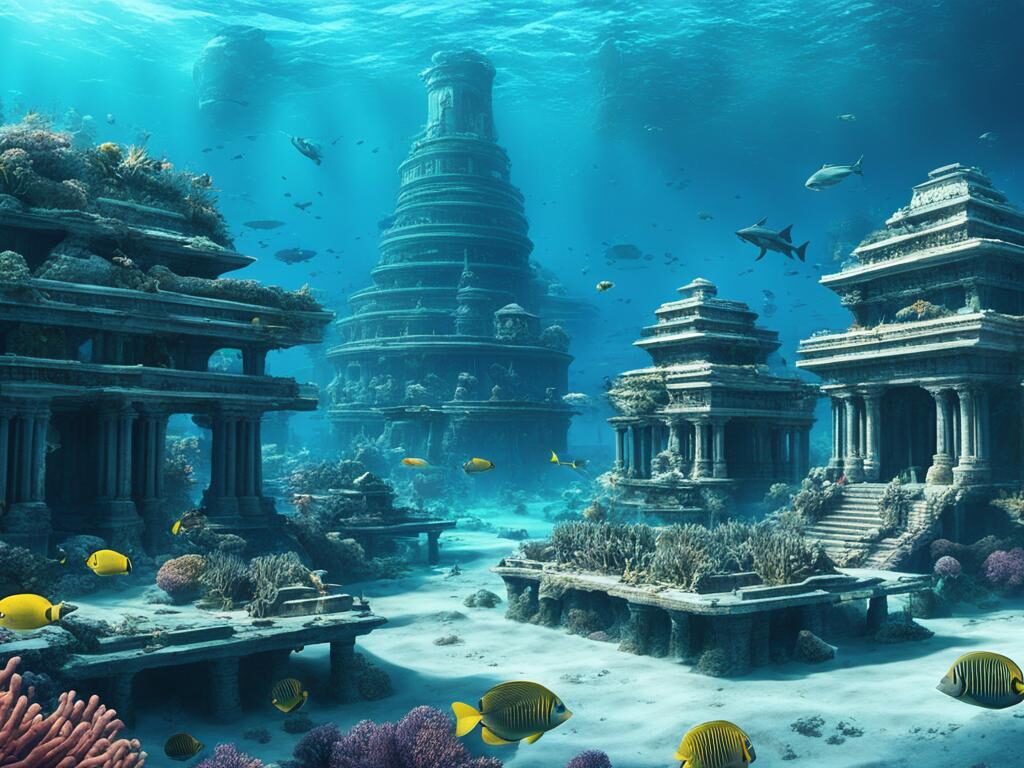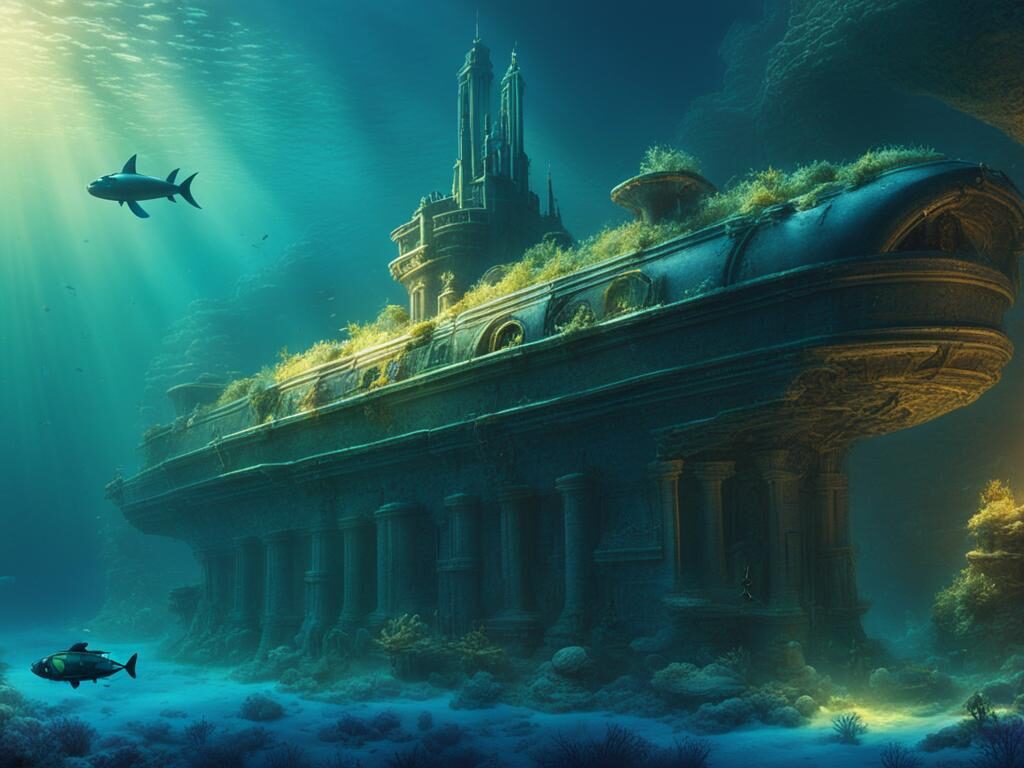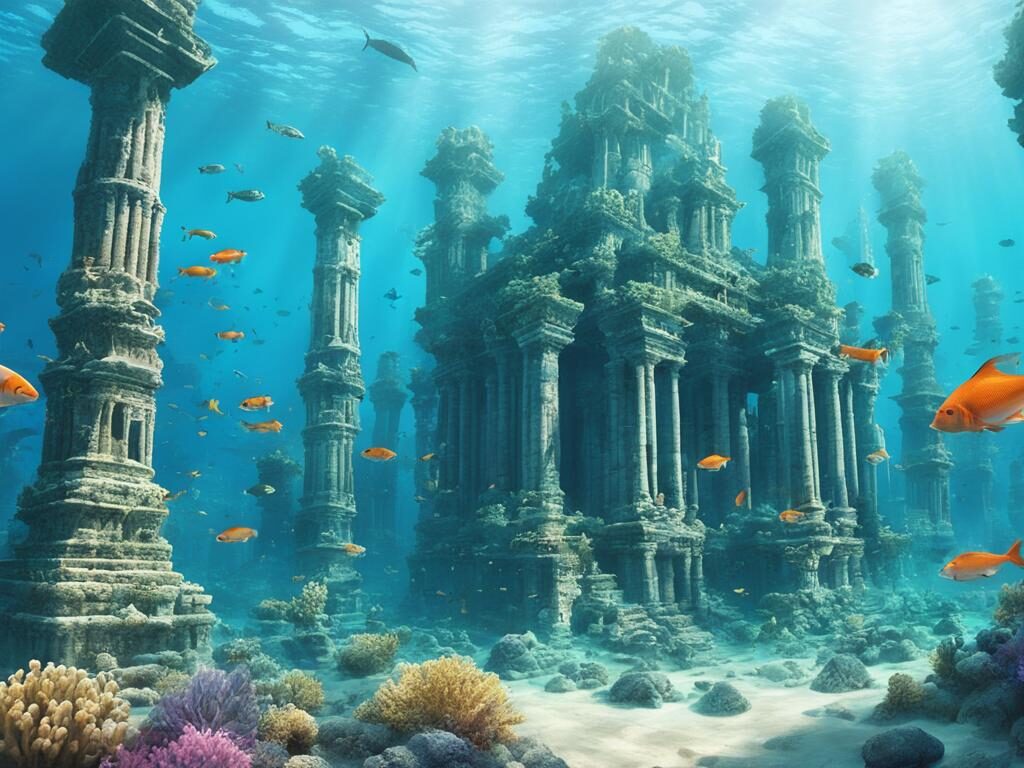The mystery of the submerged city of Atlantis, a legendary lost island kingdom, has captivated humans for centuries. The story of Atlantis originates from two dialogues written by Plato in 360 BC, where he described it as an advanced civilization beyond the pillars of Hercules. This mythical city was said to be larger than Asia and Libya combined, with a sophisticated city layout and immense wealth. Despite its grandeur, Atlantis met a catastrophic end, sinking into the sea in a single day and night. While many myths and misconceptions have arisen around Atlantis, a few facts remain. Atlantis was first introduced by Plato, its details were outlined by him, and it served as a philosophical tool to convey his ideas. The search for the actual existence and location of Atlantis continues, but no concrete evidence has been found.
Key Takeaways:
- The Lost City of Atlantis is a legendary ancient civilization submerged in the sea.
- As described in Plato’s dialogues, Atlantis was a mythological city known for its advanced infrastructure and immense wealth.
- While many myths and misconceptions surround Atlantis, Plato’s account provides the most detailed information of this archaeological discovery.
- No concrete evidence of Atlantis’s existence or its precise location has been found through archaeological discoveries and underwater explorations.
- The search for Atlantis continues, fueled by its mysterious nature and the enduring fascination with the legend.
Atlantis Myths and Misconceptions
Throughout the centuries, various myths and misconceptions have emerged surrounding Atlantis. Let’s explore some of the most prevalent misconceptions:
1. Advanced Technological Civilization
One common misconception is that Atlantis was an advanced technological civilization. However, there is no archaeological or historical evidence to support this claim. Plato’s descriptions of Atlantis primarily focus on its political structure and virtues, rather than advanced technology.
2. Bermuda Triangle Connection
Another popular but romanticized notion is that Atlantis is located in the Bermuda Triangle. This contradicts Plato’s description of its location beyond the “Pillars of Hercules,” believed to represent the Strait of Gibraltar. The Bermuda Triangle was not associated with Atlantis in Plato’s dialogues.
3. Atlantis and the Lost City of El Dorado
Atlantis and the Lost City of El Dorado are often mistakenly conflated. These are separate legends from different regions. El Dorado is associated with the search for golden riches in the Amazon rainforest, while Atlantis is a mythological island kingdom beyond the “Pillars of Hercules.”
4. Extraterrestrial Beings
Some theories suggest that Atlanteans had contact with extraterrestrial beings, based on the interpretation of their advanced knowledge. However, this claim lacks substantial evidence and remains speculative.
5. Technological Disaster and Atlantis in Antarctica
Claims that Atlantis was destroyed by a technological disaster or that it is located in Antarctica lack substantial archaeological or geological evidence. These theories often stem from misinterpretations or sensationalized versions of the Atlantis tale.
6. Atlantis as a Continent
While some interpretations suggest that Atlantis was not just a city or an island but a continent, this idea is based on misinterpretations of Plato’s original text. Plato described Atlantis as an island and a mighty naval power, not a continent.
7. Atlantis Sinking into the Atlantic Ocean
The belief that Atlantis sank into the Atlantic Ocean is also based on misinterpretations or romanticized versions of the tale. Plato’s account does not provide specific details about the exact location or the method of Atlantis’s demise.
8. Unique Physical Characteristics and Peaceful Utopia
Portrayals of Atlanteans with unique physical characteristics or Atlantis as a consistently peaceful utopia are purely fictional and not supported by Plato’s descriptions. These embellishments have been added to the Atlantis myth over time.
Despite these persistent Atlantis theories, it is important to separate fact from fiction when exploring the legend of Atlantis. Taking a critical approach and referring back to Plato’s original dialogues can help dispel these misconceptions and gain a clearer understanding of the Atlantis myth.
Confirmed Facts About the Lost City of Atlantis
Despite the myths and misconceptions, there are several confirmed facts about Atlantis that are universally accepted among scholars. These facts provide insight into the nature of Atlantis as both a historical and philosophical concept.
Atlantis as Allegory
Many historians and philosophers view Atlantis as an allegory used by Plato to convey his philosophical ideas. Plato’s dialogues, where he introduced Atlantis, were not meant to present a historical account, but rather to explore concepts of morality, honor, and the dangers of hubris.
Atlantis Search
The search for Atlantis has captivated explorers and researchers for centuries. This pursuit has led to various theories, expeditions, and quests to uncover the truth behind Atlantis. However, despite extensive efforts, no concrete evidence of Atlantis’ existence has been found.
Atlantis as a Naval Power
According to Plato’s descriptions, Atlantis was a powerful naval power with a confederacy of kings. This suggests that Atlantis had a significant military presence and influence in the ancient world.
Atlantis Political Structure
Plato also provided detailed descriptions of Atlantis’ political structure. He depicted Atlantis as a confederation of kings, implying a complex political system that had a unified ruling body.
Atlantis in Cultural and Literary Works
The story of Atlantis has had a substantial influence on various cultural and literary works throughout history. Its allure and mystique have served as inspiration for countless authors, artists, and creators.
“The legend of Atlantis has captivated imaginations and sparked creativity in literature, film, and other artistic mediums.”
Orichalcum in Atlantis
In Plato’s account, Atlantis was associated with the precious metal orichalcum. This metal was described as having a radiant red hue and was highly valued in Atlantis’s society.
Downfall of Atlantis
Plato’s narrative depicts the downfall of Atlantis as a result of its people’s moral degradation. This serves as a cautionary tale about the perils of hubris and the consequences of undermining the natural order.
Hubris Theme in Greek Philosophy
The theme of hubris, excessive pride or arrogance, is a prevalent concept in Greek philosophy. Plato’s depiction of Atlantis highlights this theme and its destructive implications.
The Lost City of Atlantis
The mystery surrounding Atlantis continues to captivate the human imagination. Despite the lack of definitive evidence, the legend of Atlantis endures as a timeless enigma that sparks curiosity and fuels the ongoing pursuit of knowledge.

Stay tuned for the next section, where we discuss the role of Schliemann’s discovery of Troy in the Atlantis debates.
The Role of Schliemann’s Discovery of Troy in Atlantis Debates
Heinrich Schliemann’s discovery of Troy has been a subject of speculation in the ongoing debates surrounding the existence of Atlantis. However, it is important to note that Schliemann’s findings do not provide evidence for the reality of Atlantis.
Schliemann did not learn the location of Troy from Homer’s texts, and his excavations did not prove what some alternative writers believed. Instead, Schliemann’s discovery of Troy was based on the location provided by Frank Calvert, who had conducted preliminary excavations in the area.
While Troy’s existence was never doubted by the ancients, the same cannot be said for Atlantis. Ancient sources consistently mentioned Troy, and the city had a historical continuity, being occupied from 3000 BCE to Homeric times. In contrast, Atlantis does not fit this pattern.
It is worth noting that associating mythic tales with actual geographic locations and underwater exploration was a common practice in ancient Greece. However, the comparison between Troy and Atlantis is not valid. Troy’s existence is supported by multiple ancient texts, archaeological sites, and geographical names tied to the city.
On the other hand, Atlantis’s mysterious city is considered a fictional place described by Plato in his dialogues. While Plato’s account of Atlantis might have been inspired by real events or locations, there is no historical support for its existence.
“Schliemann’s discovery of Troy was significant in its own right, shedding light on the ancient city’s historical continuity and capturing the imagination of scholars. However, it does not provide any tangible evidence to support the existence of Atlantis.”
Furthermore, it is important to understand that fictional places have played a significant role in literature throughout history. From El Dorado to Narnia, authors have created imaginary realms to explore themes, convey philosophical messages, or simply captivate readers. Atlantis theories, too, fall under this category of fictional places.
While Schliemann’s discovery of Troy is of great archaeological importance, it does not validate the existence of Atlantis. The association between Troy and Atlantis is not supported by historical evidence or Plato’s account. Atlantis remains a captivating myth and a prominent example of a fictional place in literature.

Troy and Atlantis: A Comparison
| Troy | Atlantis |
|---|---|
| Supported by multiple ancient texts | Described only by Plato |
| Historical continuity and archaeological evidence | No historical support or concrete evidence |
| Geographical names tied to the city | No geographical references or ancient associations |
| Occupied from 3000 BCE to Homeric times | Described as sinking in a single day and night |
Potential Historical Events Linked to Atlantis
While Atlantis is primarily considered a myth, there are some historical events that have been linked to its narrative. These events provide intriguing possibilities and potential connections to the legendary city. Let’s explore some of the most notable examples:
Possible Inspiration: Minoan Civilization
One potential inspiration for Atlantis is the Minoan civilization, known for its powerful navy and its connection to the sea god Poseidon. The Minoans thrived on the island of Crete and had a sophisticated civilization that flourished during the Bronze Age. Their advanced maritime capabilities and island-based society align with some aspects of the Atlantis myth.
The Devastating Eruption of Thera
The volcanic eruption on the island of Thera, modern-day Santorini, is often associated with the downfall of Atlantis. This cataclysmic event, which occurred around 1600 BCE, caused massive tsunamis that devastated neighboring regions, including Crete. The destruction caused by this natural disaster shares similarities with Plato’s account of Atlantis sinking into the sea.
Athens’ Victory over the Atlanteans
In Plato’s dialogues, he describes a conflict between Athens and Atlantis, in which Athens successfully resisted the invading Atlanteans. Some theorists suggest that this narrative could be connected to historical events, such as Athens’ victory over another powerful ancient civilization, the Persian Empire. While speculative, this connection highlights the potential influence of real-world events on the Atlantis story.
The Tragic Fate of Helike
In Greek history, the city-state of Helike was renowned for its wealth and power. However, in 373 BCE, it was completely destroyed by an earthquake and subsequent flooding. The story of Helike’s tragic fate bears a resemblance to the destruction of Atlantis, further blurring the line between myth and history.
Atlantis as an Allegory for Athens
Plato often used allegory to convey deeper philosophical ideas, and Atlantis is no exception. Many scholars interpret Atlantis as an allegory for Athens, warning against the dangers of power, hubris, and moral decline. This interpretation adds another layer of meaning to the Atlantis legend and its historical relevance.
While these potential connections between historical events and the Atlantis myth exist, it’s important to note that they are speculative in nature and lack concrete evidence. The true origins and fate of Atlantis remain shrouded in mystery, allowing room for continued exploration and imagination.
The Continued Enigma of Atlantis
The search for Atlantis continues to intrigue scholars and researchers, leading to ongoing debates and modern interpretations of the legend. Despite numerous expeditions and studies, the actual existence and location of Atlantis remain elusive. Plato’s precise geographic descriptions have led explorers to different possible locations, but none have produced definitive evidence of the lost city’s existence.
The allure of the lost city of Atlantis has permeated popular culture, appearing in literature, films, video games, and other cultural artifacts. Its mysterious nature and the lack of concrete evidence add to its enigmatic appeal, captivating the imagination of people worldwide.
The allure of Atlantis lies in its mysterious nature and the lack of definitive evidence. It has become a symbol of the unknown and the hidden, a tantalizing mystery waiting to be unraveled.
The search for Atlantis exemplifies the ongoing pursuit of historical and archaeological mysteries. It fuels the human fascination for ancient civilizations and the desire to uncover hidden truths. While the truth behind Atlantis may never be fully unveiled, the quest to unravel its secrets persists, illustrating the enduring allure of the lost city.
Modern Interpretations of Atlantis
- The theories suggesting Atlantis as an advanced civilization with futuristic technology have sparked the imagination of many.
- Some propose Atlantis as a metaphor for a lost utopian society or a cautionary tale about the consequences of human hubris and moral decline.
- Others view Atlantis as a reflection of real historical events and ancient civilizations, such as the Minoan civilization or the volcanic eruption of Thera.
Atlantis in Popular Culture
The allure of Atlantis has not only captured the interest of scholars and researchers but has also permeated popular culture. It has inspired numerous literary works, films, and TV shows, becoming a recurring motif in the realms of fantasy and adventure.
“Atlantis will always be a subject of fascination and speculation, woven into the fabric of our collective imagination.”
From Jules Verne’s “20,000 Leagues Under the Sea” to Disney’s animated film “Atlantis: The Lost Empire,” the mythic city continues to captivate audiences worldwide.
The Mysterious Nature of Atlantis
One of the reasons Atlantis remains an enduring enigma is the lack of definitive evidence. The absence of conclusive archaeological discoveries has fueled ongoing debates and opposing theories surrounding its existence.
Plato’s detailed descriptions have led to various interpretations, with proponents suggesting different locations, from the Mediterranean to the Caribbean and even Antarctica. However, without tangible evidence, Atlantis remains an enigmatic puzzle yet to be solved.
The Lack of Definitive Evidence
The quest for Atlantis has been hindered by the lack of concrete evidence. Despite the enthusiasm and dedication of explorers and researchers, no definitive proof of Atlantis has been found.
Archaeological expeditions, satellite imaging, and underwater explorations have yielded intriguing findings, but none have provided irrefutable evidence confirming the existence of the lost city. Atlantis remains a tantalizing legend waiting to be confirmed or debunked.

Conclusion
In conclusion, the Lost City of Atlantis remains a captivating enigma, shrouded in myth and mystery. While it is primarily considered a mythical tale, Atlantis also serves as a philosophical allegory in Plato’s works, exploring themes of power, hubris, and the consequences of human actions.
Throughout history, the ongoing search for Atlantis has driven explorers and researchers to uncover its secrets. Yet, despite numerous expeditions and studies, no concrete evidence has been found to prove its existence as a physical city.
However, the enduring allure of Atlantis lies in its elusive nature and the potential for new discoveries. The legend continues to captivate our collective curiosity, inspiring us to delve into the depths of ancient history and explore the mysteries that lie beneath the surface.
While the truth behind Atlantis may never be fully unveiled, its legacy as a mythical tale and philosophical allegory will continue to intrigue and inspire generations to come.






























